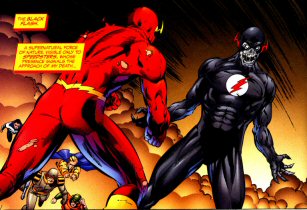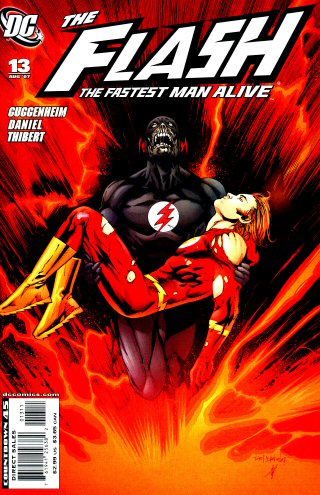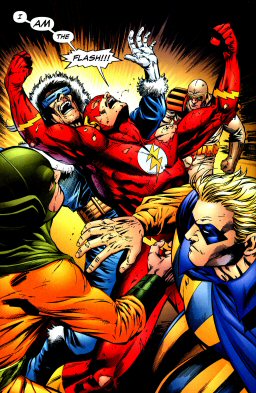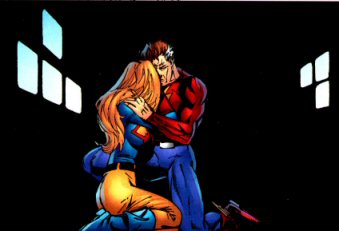Bart Allen is dead, all in accordance with
a prophecy brought to him by his grandmother, Iris Allen.
So we were warned, but who believed it? In the process,
for the first time in their history, the Rogues have gone
from strangely affable villains in a game of cat and mouse
with a speedster to cold-blooded (if panicked) killers.
That's not quite fair. The way Marc Guggenheim
wrote Bart's death, you could make a case for it being accidental,
a desperation move by his foes unintentionally overloading.
It might be the first case of "Death By Too Many Gimmicks."
Though this run of Flash, the Fastest
Man Alive stumbled to thirteen issues, fans never really
sparked to Bart taking the full-on scarlet mantle of his
grandfather. And so DC pulled the plug and, like the return
of Hal Jordan to life and the role of Green Lantern, will
give the fans what they think they want.
In three weeks, Mark Waid returns to writing
Wally West as The Flash. Granted, Geoff Johns made a mark
on the character, too, but it's generally acknowledged that
Waid's run on Flash stands as one of the greats in
comics history. Some say you can't go home again, but enough
time has passed and enough changes wrought on Wally (and
Waid) that this could be something new and different and
just like old times all at once.
Aside from allowing Wally to return, the
death of Bart also allowed DC to redefine and undo some
damage from the last couple of crises. Though it wasn't
necessarily Brad Meltzer's intent, Identity Crisis
allowed for the possibility that the Rogues had been kept
mild through mind control. Geoff Johns ran with that idea,
retconning a time when an altered Top had begun messing
with the heads of his fellow Flash villains, considering
himself a hero.
From the beginning of his ascendancy as
one of DC's top writers, Johns has subscribed to the theory
that modern times require villains to be more powerful,
more ruthless and far less moral than they used to be. He
allowed an exception for Len Snart, Captain Cold, who subscribed
to a peculiar code of honor, though it didn't rule out killing
if he had a good enough reason.
To that end, Johns wrote a Flash
special, Iron Heights, which introduced the next
generation of Rogues, killers almost to a man. Among them
was the horrific Murmur, a man who cut out the tongues of
his prey before killing them. Even the warden believed that
the ends justified the means, and long before it became
politically fashionable, he had no problem with torturing
super-powered prisoners, and if a few died…well, go ahead
and cry, you liberal whiny-pants.
This new generation allowed the old Rogues
to feel morally superior, but after Identity Crisis,
it became clear that wasn't good enough for Johns. Old and
new clashed, but instead of making a stand for a kinder
gentler villainy, it became an excuse for the old guard
to become crueler and more dangerous.
Not a one of them was safe from the possibility
that they'd had their minds messed with, and this extended
outward in the DC Universe to Catwoman. At least Selina
Kyle decided that even if she had been rewired against her
will, she liked it better on the slightly sunnier side of
the law. Under Johns' writing, the Flash Rogues made a different
decision, and two allies of The Flash turned rogue again,
the Trickster and the Pied Piper.
Call it a continuity punch in the gut from
Superboy-Prime, but both those characters actually had well-written,
well-reasoned explanations for having joined the side of
justice, if not the heroes themselves. James Jesse, the
Trickster, had helped the Rogues escape from the clutches
of DC's current demon lord, Neron. After brushing up against
evil so naked, Jesse felt a need to atone for his past crimes.
Let me repeat that - the Trickster turned good after ripping
off the devil. It's a legitimate win for the forces
of Judeo-Christianity, acknowledging the Almighty after
an encounter with his opposite number.
But Johns doesn't have much patience for
true spirituality in the DC Universe. Take a look at a scene
in Infinite Crisis as Mr. Terrific stands outside
a church, insistent in his atheism. Never mind that Zauriel,
indisputably a member of the warrior host of Heaven, gives
the sermon inside. When questioned as to how he could not
believe when his own team included the Spectre as a member,
Mr. Terrific dismissively answers, "before my time." Convenient,
then, to forget that it was The Spectre who inspired and
encouraged him to take the mantle of the first Mr. Terrific,
Terry Sloane. Seems like sloppy thinking for the third smartest
man on Earth. At best, it's ungrateful.
 |
As for the Pied Piper, he had started doing
charity work and forged an uneasy friendship with Wally
West. Eventually it turned into outright respect for each
other, and though he'd likely never carry his own title,
Piper was one of the first and few gay super beings in comics.
He chose the right because it was the right thing to do.
When Geoff Johns left Flash, he
left those two characters firmly back on the side of the
Rogues. Early issues of Countdown have included their
efforts to prove themselves bad again. There writer Paul
Dini has left room for doubt, as the two have found ways
to fake their way out of the worst crimes the Rogues ask
of them.
Then Bart had to die.
Now in the pages of Countdown, Dini
can put them back on the right path. We know from DC Nation
that the two would be "Villains Defiant," and now we understand
they're on the run from both sides. Moreover, the action
here may change a lot of things. We're not about to see
a kinder, gentler Joker, but some villains may re-evaluate
their savagery. Yes, we need arch-enemies in order to make
superhero tropes work, but for the Flash, they're Rogues,
they're Scoundrels, not Right Bastards.
As for Bart's death itself, it undid a
lot of things that DC editorial wanted to try but bombed
with fans. The Speed Force reasserts itself, Wally returns
and …well, as Lon Lopez keeps pointing out to me, Bart technically
hasn't been born yet. If we can see an alternate Legion
of Super-Heroes come back and release Wally from the lightning,
we can have an alternate Bart come back.
Yet it's a tough call to make. To make
up for the Geoff Johns criticism above, he had figured
out something truly interesting and worthwhile to do with
Bart for the first time since, well, Mark Waid left Impulse.
If someone at DC can figure out how to at least get back
to that point, we can welcome a return of Kid Flash. Unless
Wally's daughter wants the job.
In the meantime,
Bart Allen died a hero, tragically too young - technically,
the guy couldn't have been more than ten or eleven years
old. Maybe DC could stop it here for a while. We get it.
Heroism has a price. It would be nice if stories in the
DC Universe could reflect that heroism also is worth every
penny that gets paid.









